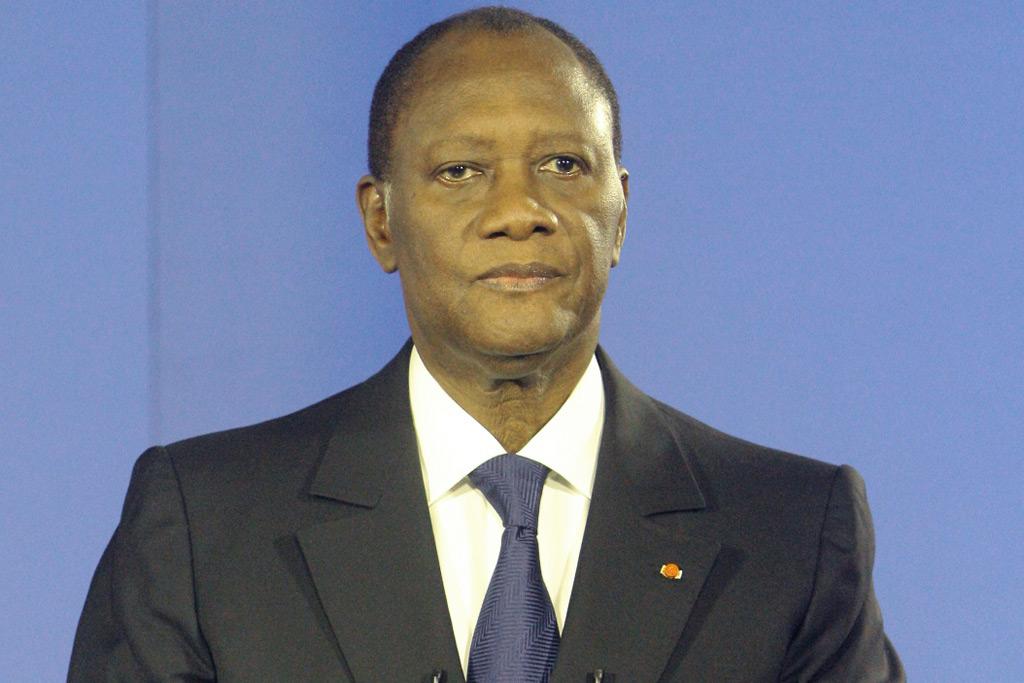Ivory Coast’s Ouattara warns against reprisals after Gbagbo arrest
Ivory Coast’s internationally-recognized President Alassane Ouattara speaks on April 11, 2011 in Abidjan. Ouattara called on Ivorians to abstain from reprisals and violence and said he wanted to create a truth and reconciliation commission to draw a line under his country’s conflict.
ABIDJAN, Ivory Coast — Ivory Coast's internationally-recognized president, Alassane Ouattara, urged his countrymen not to seek reprisals following the arrest of his rival Laurent Gbagbo.
In a television address made after Gbagbo was hauled out of the burning bunker where he made his last stand against an assault backed by French and United Nations forces, Ouattara said the former president would face justice.
"I call my fellow countrymen to abstain from all form of reprisal and violence," he said late Monday. "Our country has turned a painful page in its history."
Images of Gbagbo in custody were also broadcast on state television (see video below). He was in a sweaty undershirt after being captured by Ouattara's forces
Despite the humiliating defeat, Gbagbo stubbornly refused to sign a statement ceding his claim to be the legitimate leader of Ivory Coast.
Ouattara, dressed in a smart suit, called for calm and urged militias to lay down their weapons.
He said a truth and reconciliation commission would investigate allegations of atrocities against civilians by both sides.
However there are reports of reprisal killings by pro-Ouattara forces in western Ivory Coast, an area where human rights groups already have compiled estimates of hundreds of people killed, according to AP.
The ground assault by Ouattara's forces on Gbagbo came after air and ground attacks by U.N. and French helicopter gunships that began Sunday lasted until the early hours of Monday. French armored tanks rolled into the area surrounding Gbagbo's residence in the Cocody district of Abidjan. Then Ouattara's troops surrounded the bunker and entered it to capture Gbagbo.
Gbagbo surrendered at the entrance to the residence, while four French Gazelle helicopters hovered over the area. He was taken to the Golf Hotel where Ouattara has set up his offices and which is heavily guarded by U.N. peacekeepers. Gbagbo was arrested with his wife, Simone, son Michel and about 50 other close aides.
Gbagbo “is alive and he will be brought to justice to respond to the crimes he committed. In this way, the Cote d’Ivoire reaches the end of its tragedy, of its nightmare. … His era is over,” said Youssoufou Bamba, Ouattara’s representative to the United Nations in New York, according to the New York Times.
Gbagbo's arrest is hoped to bring Ivory Coast back from the brink of civil war and to resume ordinary economic and political life. Ouattara has a tough challenge in bringing the country back to normal life. Gbagbo won 46 percent of the vote and those voters must be persuaded to back the new Ouattara government.
It is expected that Gbagbo will face charges for abuses of human rights during his rule. It is not known if he will face charges in Ivory Coast, but many expect that the International Criminal Court in the Hague will press charges against the former leader.
Ouattara won the November elections, according to Ivory Coast's election officials and the United Nations, but Gbagbo, who had been president for 10 years, refused to acknowledge defeat and step down from power. The dispute pushed the world's largest cocoa producer to the brink of renewed civil war.
Late last month forces backing Ouattara began an offensive to oust him and quickly took control of most of Ivory Coast. Ouattara's forces met resistance in Abidjan, the country's largest city. Gbagbo took refuge from the heavily fortified bunker beneath the presidential residence.
Every day, reporters and producers at The World are hard at work bringing you human-centered news from across the globe. But we can’t do it without you. We need your support to ensure we can continue this work for another year.
Make a gift today, and you’ll help us unlock a matching gift of $67,000!
